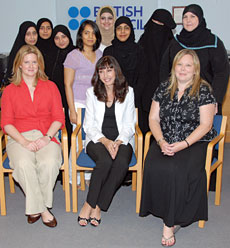The first group of students to take the Certificate in English Language Teaching to Adults (CELTA) received their provisional results at the British Council in Jeddah yesterday. The 10 candidates, all women, passed subject to final independent ratification by Cambridge University. The candidates took the month-long intensive course at the British Council’s Women’s Center in Jeddah.
“I can confirm all the candidates reached the required pass standard and we have at least three star candidates who have achieved significantly higher passes,” said Helen Glenn, center manager. “I feel we can safely say that this inaugural course has been a complete success.” The newly qualified teachers should receive their accreditation certificates in about six weeks and official confirmation in about a week.
The course, a mix of practical teaching using methodology devised by John Haycraft, the founder of International House, an internationally recognized teacher training organization, stretches students from the outset. The tried and tested methods of language teaching in the course challenge traditional pedagogical methods and focus on student-centered learning rather than didactic front-of-class teaching.
“The biggest test for me was unlearning what I had been taught as a teacher,” said Safira Hafesjee an English language teacher with four years teaching experience. “Standing in front of a class was no problem, I had my confidence. It was trying to remember to do things the CELTA way.” She added that she found it hard to have traditional teaching methods that she had grown used to criticized closely and redirected. “However, you learn a lot by being put in that spot where trainers and other trainees are criticizing you — it is constructive and you learn quickly.” She thought that the result went far beyond a teaching certificate. “It has completely changed my whole approach to teaching and made me question the way other teachers work.”
In conversation, the candidates agreed that there was a difference between having a degree and being able to teach. “In this country people are infatuated with degrees — if you have the degree, then you have got the job,” said one.
During the course, trainees are required to keep a highly detailed and self-analytical diary of how they feel they progressed. The confidential document is shared only with their tutor. “It is very embarrassing putting down what went wrong and then having to deal with it — but it actually helps you because it gives things that you have to focus on,” said Nabiha Wangde who came to the course having taught for eighteen months and wanted to develop her skills. “I felt I was beginning to stagnate,” she confided.
She too thought that teaching methods in Saudi Arabia tended to be teacher centered. “With CELTA it’s all about the language learner. It’s about making it easier for them and leading them into the topic or piece of language you want to teach,” she said. She admitted that she had to constantly remind herself before setting a task that teaching was not about the teacher but the student. “They have to learn the language point by themselves; you give them the concept. That was difficult, for at times we would slip back into our old ways.”
All the graduates agreed that one of the most difficult challenges was to become comfortable with silence, when not to speak or teach and give the language learner time to work out problems on their own.
While it is usual for CELTA teachers to hold at least a first degree, it is not mandatory. Reema and Mome Hussain are still university students. “I took it on with a view of getting a part-time job,” Reema said. “The most surprising thing about it was how tough it was. It was a lot of work and very trying emotionally.” As with most of the trainees, Reema found the constant observation very difficult to accommodate. “The criticism — it wasn’t harsh, it was constructive but it was hard to take,” she said. “But it was certainly worth it! Every English language teacher should take this course.”
Mome found the best part of the course was in learning how to teach. “I picked up all those good points from my good teachers — the things that made them special. As a student I couldn’t put my finger on them — but during the CELTA I recognized them and, I think, I can now do them as well.”
The course involved the trainees in teaching practice from their first day, a new experience for most. The practice students were invited to learn English from the trainees. “Unusually, nearly all the students came to all the sessions,” said Glenn. “The trainees were really holding their attention well.”
New to Mome was the test/teach/test approach of the course. “The students we taught were motivated to learn the rules for themselves rather than have me pounding them in,” she said.
The CELTA teaching method emphasizes the use of play, goals and links, for example, verbs to actions. “They did it all on their own — I didn’t have to do any talking at all. It changes your role completely — it’s exciting when it happens; you become a facilitator rather than a teacher and watch the learning take place.”
She was very certain about the benefits of the course and how they might apply to her university career. “I have definitely achieved something out of this. Having learned how to teach, we have also learned how to learn.”


